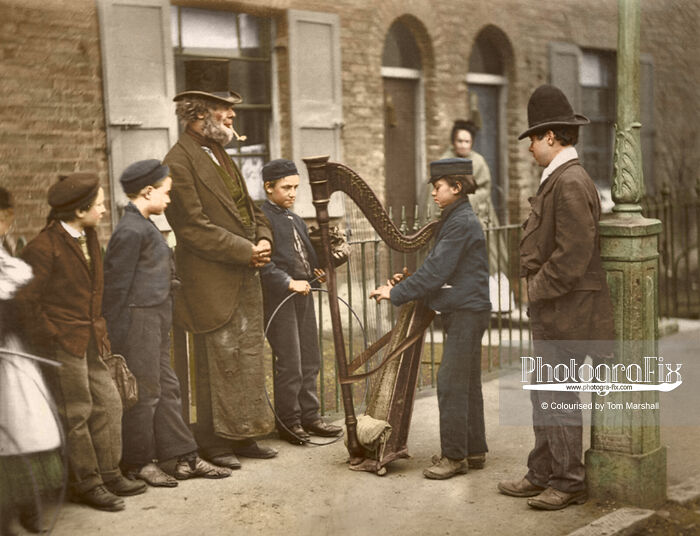
[ad_1]
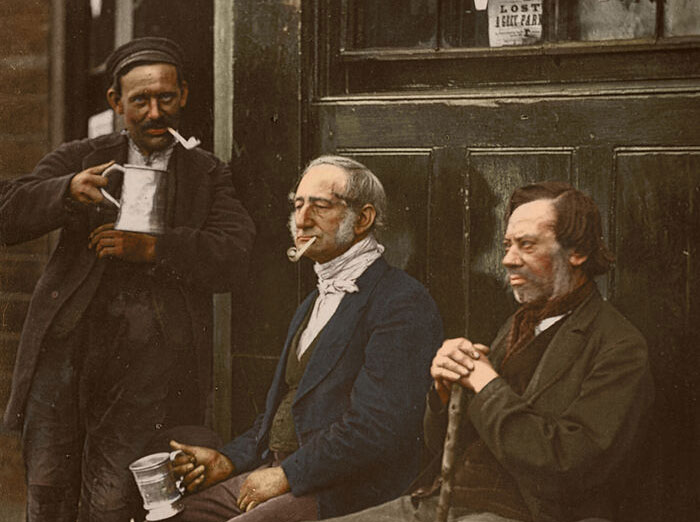

According to Tom Marshall: “In the mid-1870s, Scottish photographer John Thomson captured the daily toil and struggle of the ‘street folks’ of London, in a series of photos that laid the foundations for modern photojournalism. Working with a radical journalist called Adolphe Smith, Thomson produced a monthly magazine ‘Street Life in London’ from 1876 to 1877.
The photographs Thomson took depict real life in Victorian-era London, showing the poorest of the poor and how they managed to survive, in scenes that could have been written by Charles Dickens. Smith would interview the subjects of street photography pieces, often preserving the unique dialects and expressions of a world now long forgotten, and the interesting photos lent authenticity to his text. Thomson and Smith published their black and white photos and interviews in a book in 1878 from which the following images were taken.
I believe that colourised photos can allow a modern audience to engage better with the subject, especially in an age where we see thousands of images on a news feed every day. Colour brings out hidden details in these old photos, which are often lost in black and white, and it causes the viewer to pause and look. This is not to say that the original old photos are not fascinating in their own right, but I believe that the addition of colour and some photo restoration helps to enhance the Victorian England scenes and forces the viewer to spend more time looking into it and reading the accompanying caption.
I am a photo colouriser and restorer, trading as PhotograFix. I have had the pleasure of working with some of the world’s leading museums, photo archives and publishers, as well as private commissions and projects I undertake for fun.
I live in Leicestershire, England, have been married for just over a year, and we have two cats. My main work is colourising photos, but I also make and sell scale models, a process that uses many of the same methods of using colour and weathering techniques.”
Please note that the captions accompanying the photos come directly from Adolphe Smith, the journalist who accompanied photographer John Thompson. The wording is exactly as written and may contain outdated language and terms some may find offensive.
More: Tom Marshall, Instagram, Facebook h/t: boredpanda
Shoe Black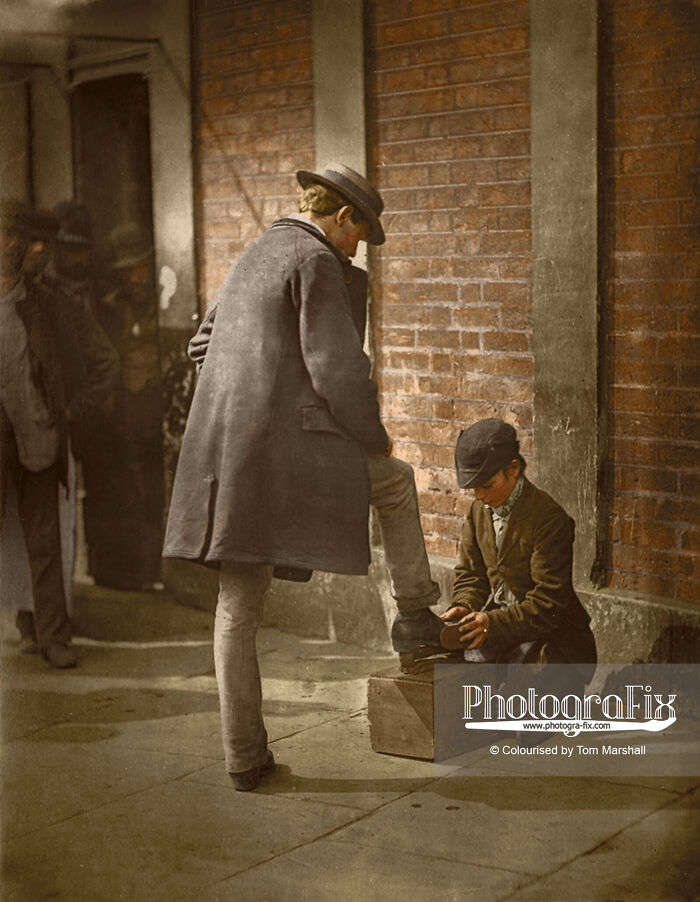

“The police have not been uniformly successful in stamping out unlicensed shoe-blacks. In some cases the tradesmen came out of their shops and spoke in their favour; they objected that the shoe-black had been standing outside their doors for many years, was well known to the neighbourhood, had proved himself useful in running errands, or lent his aid to put up the shutters in the evening, and that, consequently, the policeman would oblige them by leaving him alone.”
Dealer In Fancy Goods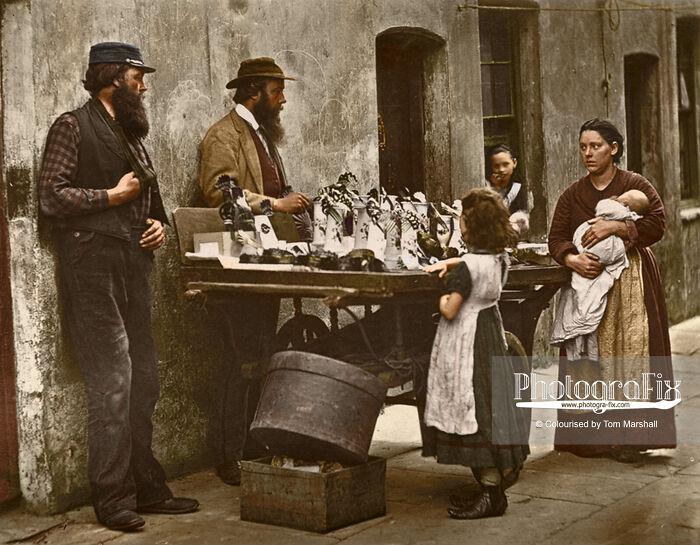

“The accompanying photograph represents a street group gathered round a dealer whose barrow is one of the most attractive I have seen during my wanderings about town. The story of its owner was narrated to me in the following words:
“There are now too many ‘swags’ and most of them ain’t the gentlemen they used to be. I should say there are 1500 ‘swag’ dealers about London, counting women, boys, and girls. The average clear profits all round would, I think, be about fourteen shillings each a week. My missus and myself between us, we make clear over thirty shillings a week. It takes about thirty shillings to keep us, five shillings a week rent, and the rest for clothes, food, and fuel.
Three or four years ago I have drawn as much as two pounds on a Saturday night. Out of that, I had about twenty-six shillings profit. Now I have not been drawing more than five shillings a day, except on rare occasions. The profits are much lower at present. Ten shillings out of the sovereign is considered good now.
The profit is not so great as it looks when you think of how long we stand and how many are the folks we supply before we get a pound. It must take about fifty customers to make up a pound of money. Times are bad, and I have left the streets for a regular job. My wife minds the barrow.
But bad as times be, it’s wonderful how women will have ornaments. I have had them come with their youngsters without shoes or stockings, and spend money on ear-drops, or a fancy comb for the hair.””
Crawler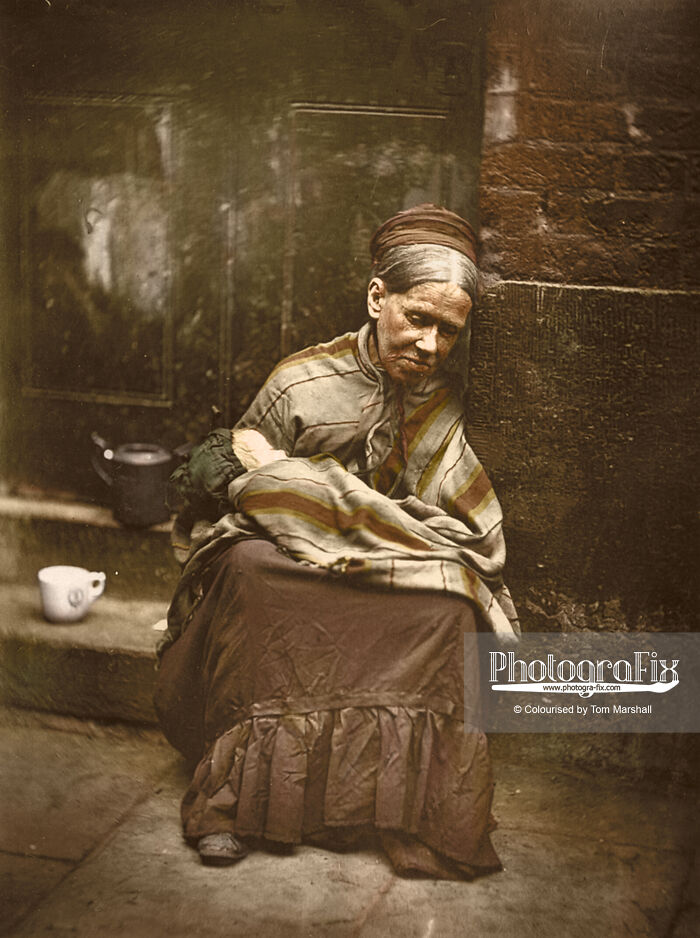

“Some of these crawlers are not so devoid of energy as we might at first be led to infer. A few days’ good lodging and good food might operate a marvellous transformation. The abject misery into which they are plunged is not always self sought and merited; but is, as often, the result of unfortunate circumstances and accident.
The crawler, for instance, whose portrait is now before the reader, is the widow of a tailor who died some ten years ago. She had been living with her son-in-law, a marble stone-polisher by trade, who is now in difficulties through ill-health. It appears, however, that, at best, “he never cared much for his work,” and innumerable quarrels ensued between him, his wife, his mother-in-law, and his brother-in-law, a youth of fifteen. At last, after many years of wrangling, the mother, finding that her presence aggravated her daughter’s troubles, left this uncomfortable home, and with her young son descended penniless into the street. From that day she fell lower and lower, and now takes her seat among the crawlers of the district.”
Gypsy Caravan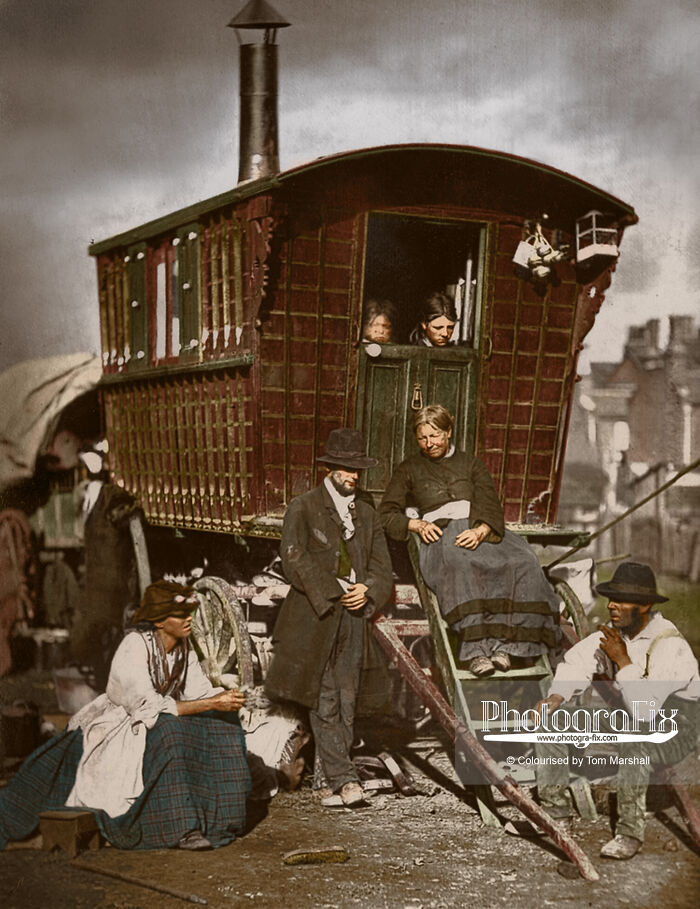

“The class of Nomades with which I propose to deal makes some show of industry. These people attend fairs, markets, and hawk cheap ornaments or useful wares from door to door. At certain seasons this class ‘works’ regular wards or sections of the city and suburbs. At other seasons its members migrate to the provinces, to engage in harvesting, hop-picking, or to attend fairs, where they figure as owners of ‘Puff and Darts’, ‘Spin ’em rounds’, and other games.
The accompanying photograph, taken on a piece of vacant land at Battersea, represents a friendly group gathered around the caravan of William Hampton, a man who enjoys the reputation among his fellows, of being ‘a fair-spoken, honest gentleman’. Nor has subsequent intercourse with the gentleman in question led me to suppose that his character has been unduly overrated.
He honestly owned his restless love of a roving life, and his inability to settle in any fixed spot. He also held that the progress of education was one of the most dangerous symptoms of the times, and spoke in a tone of deep regret of the manner in which decent children were forced nowadays to go to school.
‘Edication, sir! Why what do I want with edication? Edication to them what has it makes them wusser. They knows tricks what don’t b’long to the nat’ral gent. That’s my ‘pinion. They knows a sight too much, they do! No offence, sir. There’s good gents and kind ‘arted scholards, no doubt. But when a man is bad, and God knows most of us aint wery good, it makes him wuss. Any chaps of my acquaintance what knows how to write and count proper aint much to be trusted at a bargain.’
The dealer in hawkers’ wares in Kent Street, tells me that when in the country the wanderers live wonderful hard, almost starve, unless food comes cheap. Their women carrying about baskets of cheap and tempting things, get along of the servants at gentry’s houses and come in for wonderful scraps. But most of them, when they get flush of money, have a regular go, and drink for weeks; then after that, they are all for saving… They have suffered severely lately from colds, smallpox, and other diseases, but in spite of bad times, they still continue buying cheap, selling dear, and gambling fiercely.
Declining an invitation to ‘come and see them at dominoes in a public over the way’, I hastened to note down as fast as possible the information received word for word in the original language in which it was delivered, believing that this unvarnished story would at least be more characteristic and true to life.”
‘Tickets’ A Sign Painter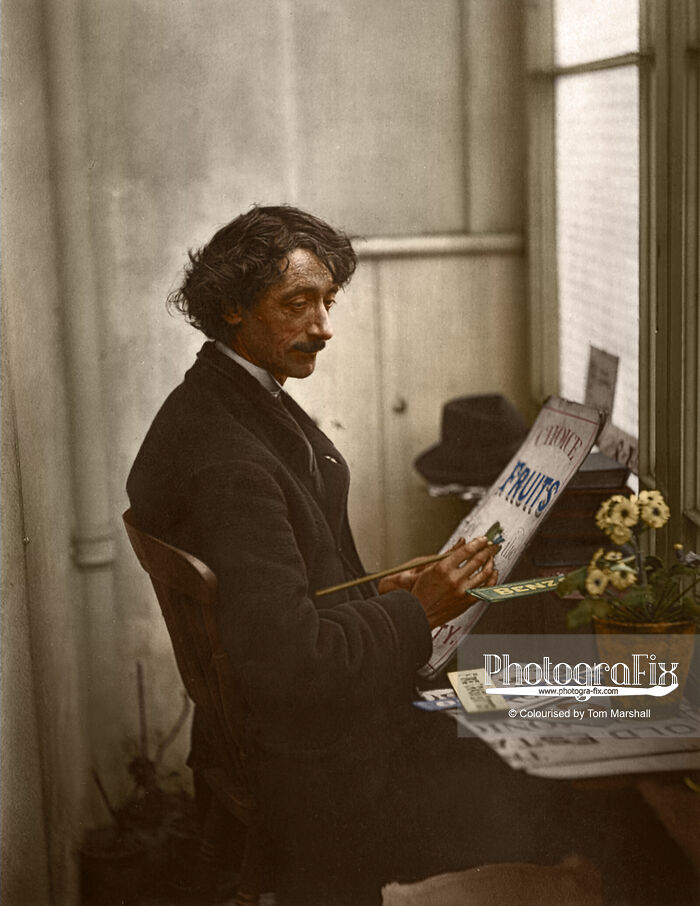

“About this time “Tickets” made the acquaintance of a Frenchman who possessed considerable skill as a sign-painter, and the two forthwith entered into a partnership. The one paints, the other undertook to travel. “Tickets” is the traveller. From morning till night he wanders about, looking into the windows of small shops, till he discovers a ticket of dingy appearance, stained in colour, dog’s eared, bent, and altogether disreputable.
With eagle eye all these defects are discerned, and “Tickets” enters boldly into the shop, to press on the tradesman the advisability of purchasing a new ticket. He undertakes to supply a precise copy of the old and worn announcement on a better piece of cardboard, freshly painted, or, perhaps, more elaborately ornamented. He hopes that the number of his customers will gradually increase and that he will be able to save on his earnings. Then, like a true Frenchman, he will return to France and purchase the goodwill of some small shop. In the meanwhile, he observes the strictest economy. He never drinks. His bed costs him two shillings a week. His breakfast consists of cocoa and bread, and butter, the former being more nutritious than tea. For dinner, he generally consumes a pennyworth of potatoes, with a herring or a haddock and a cup of tea, while his supper consists of bread and cheese to the value of twopence. It is only on days of exceptional good fortune that he indulges in a little meat.”
Flower Traders At Covent Garden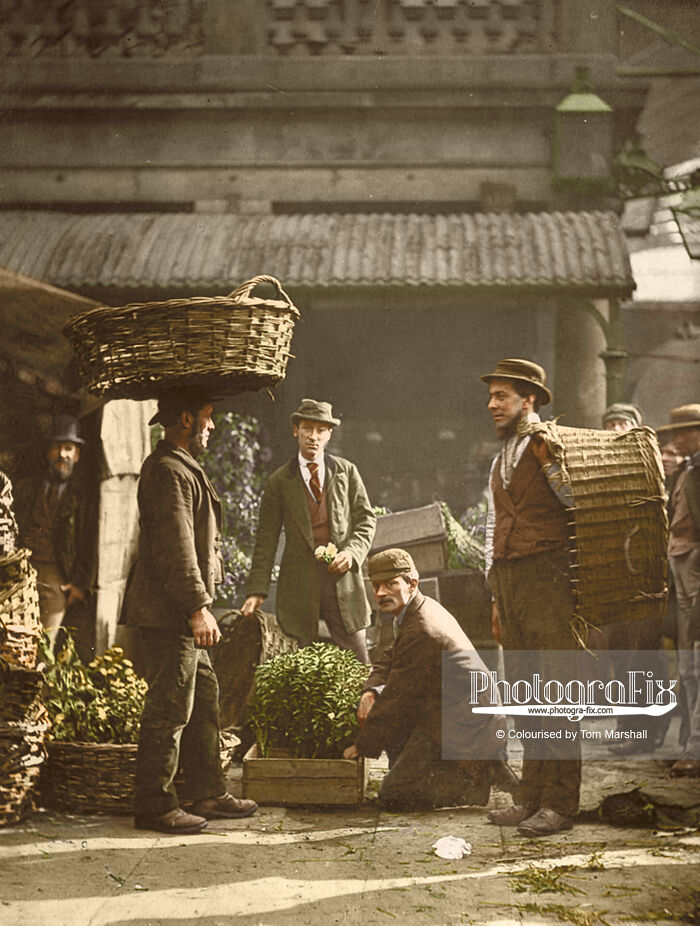

“The accompanying photograph represents a group of labourers who are in the service of Mr. Dickson, the well-known florist. Their business is strictly limited to flowers, and they never touch either vegetables or fruits. Nevertheless, I am informed that there are five hundred flower stalls at the wholesale flower market, and, at a rough computation, two thousand men are engaged to bring and grow stock for these stalls; while another two thousand men find employment in distributing the flowers to their various purchasers. Only a small proportion of these latter are seen at Covent Garden during the daytime; it is in the early morning that they congregate on this spot, and they are soon scattered again to all parts of the metropolis, laden with plants of every description.”
Canal Bargemen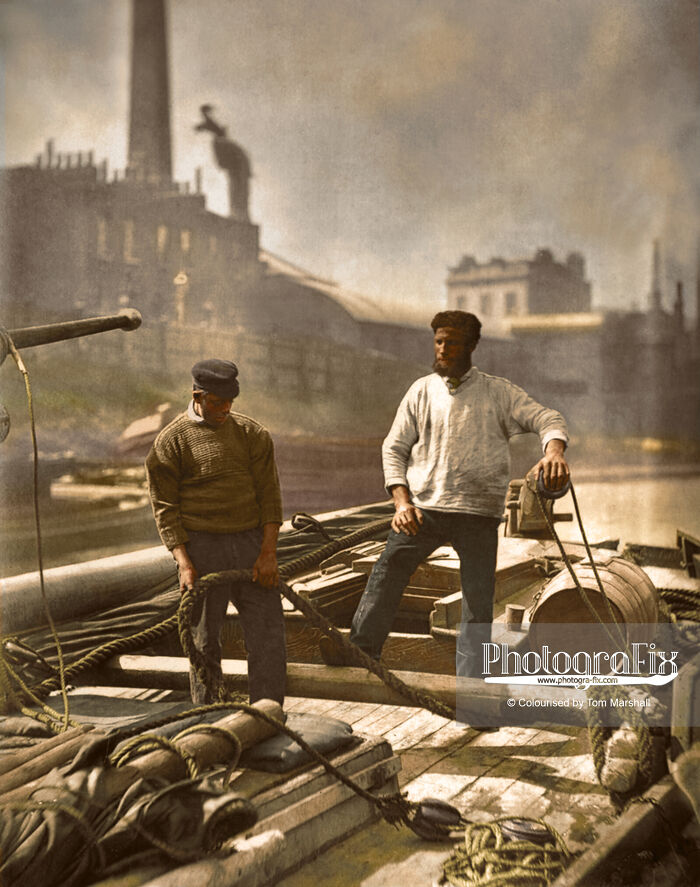

“There are, undoubtedly, many most honest, hard-working, and in every sense worthy men, who hold licenses from the Watermen’s Company, or from the Thames Conservancy. That these men are rough and but poorly educated is a natural consequence of their calling.
Never stationary in anyone place, it is difficult for them to secure education for their children, and regular attendance at school would be impossible unless the child left its parents altogether. Thus there is an enormous percentage of men who cannot read at all. Their domestic arrangements are, however, better than the canal bargemen. Cramped up in little cabins, the scenes of over-crowding enacted on board canal barges, equal and even exceed in their horrors what occurs in the worse rookeries of London.
Fortunately, the very nature of their occupation compels the men to enjoy plenty of fresh air and invigorating exercise, and this naturally counteracts the evil effects resulting from their occasional confinement in cabins unfit for human habitation.”
Furniture Shop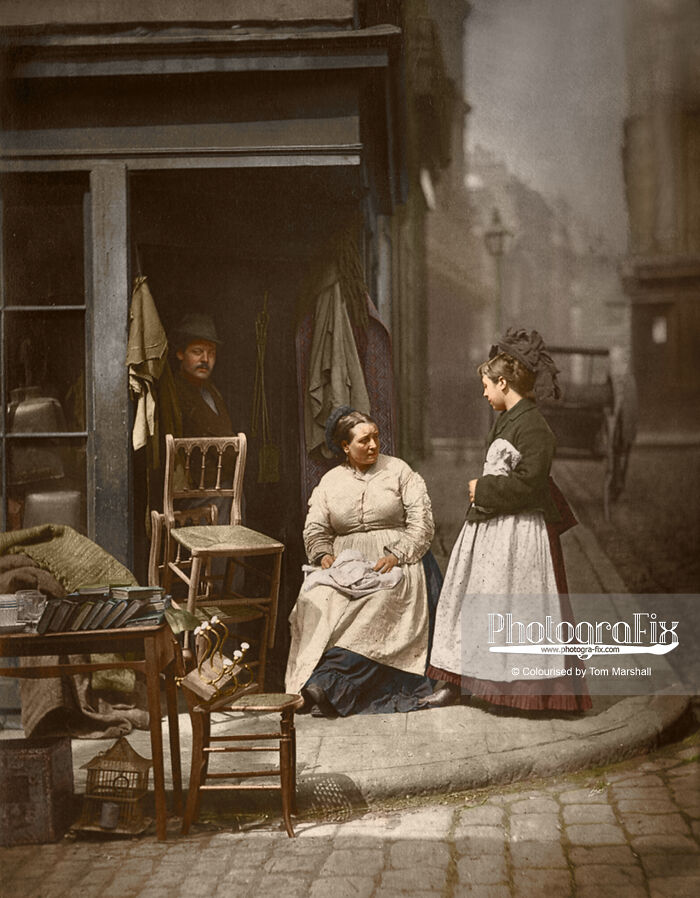

“At the corner of Church Lane, Holborn, there was a second-hand furniture dealer, whose business was a cross between that of a shop and a street stall. The dealer was never satisfied unless the weather allowed him to disgorge nearly the whole of his stock into the middle of the street, a method which alone secured the approval and custom of his neighbours. As a matter of fact, the inhabitants of Church Lane were nearly all what I may term “street folks” – living, buying, selling, transacting all their business in the open street.
It was a celebrated resort for tramps and costers of every description, men and women who hawk during the day and evening the flowers, fruits, and vegetables they buy in the morning at Covent Garden. When, however, the question of improving this district was first broached, Church Lane stood condemned as an unwholesome over-crowded, thoroughfare, and the houses on either side are now almost entirely destroyed, and the inhabitants have been compelled to migrate to other more distant and less convenient parts of the metropolis.”
Street Doctor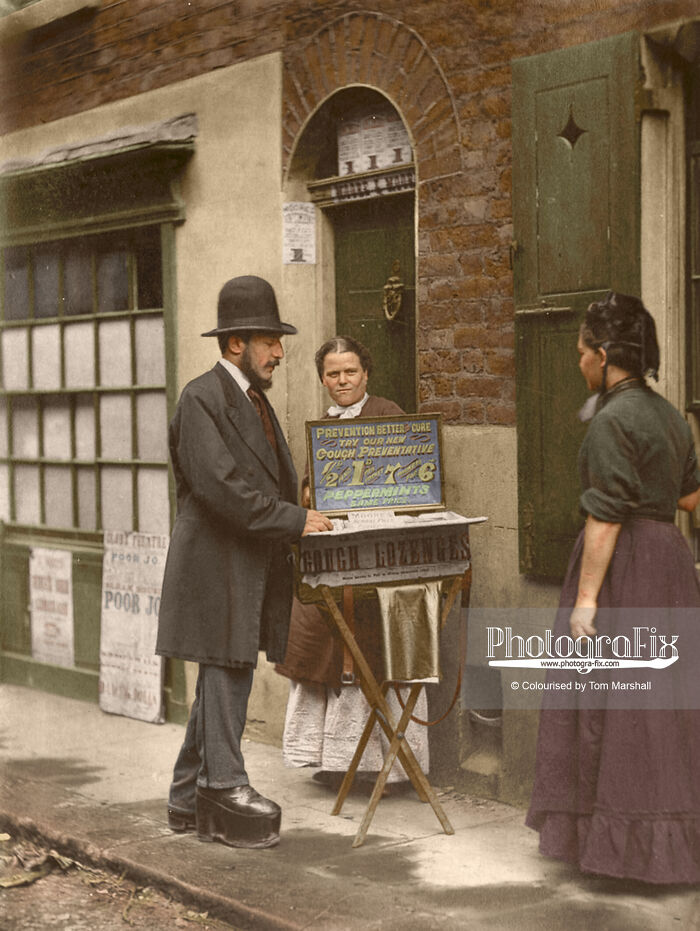

The subject of the accompanying illustration is a vendor of cough lozenges and healing ointment. He was originally a car-driver employed by a firm in the city but had to leave his situation on account of failing sight. His story, told in his own words, is as follows:
“First of all, I had to leave my place on account of bad sight. It was brought on by exposure to the cold. Inflammation set in the right eye and soon affected the left. The doctors called it ‘atrophy.’ I went to St. Thomas’s Hospital for nine months, to St. George’s Hospital, and to Moorfields Opthalmic Hospital. From St. Thomas’s Hospital I was sent to the sea-side at the expense of the Merchant Taylors’ Company.”
No good came of it all, and at last I was so blind that I had to be led about like a child. At that time my wife worked with her needle and her hands to keep things going. She used to do charing during the day and sewing at night, shirt-making for the friend of a woman who worked for a contractor. She got twopence-halfpenny for making a shirt, and by sitting till two or three in the morning could finish three shirts at a stretch. I stood at a street corner in the New Cut selling fish and had to trust a good deal to the honesty of my customers, as I could not see.
At this time I fell in with a gentleman selling ointment, he gave me a box, which I used for my eyes. I used the ointment about a month and found my sight gradually returning. The gentleman who makes the ointment offered to set me up in business with his goods. I had no money, but he gave me everything on trust. It was a good thing for both of us because I was a sort of standing advertisement for him and for myself.
I now make a comfortable living and have a good stock. When the maker of the ointment started he carried a tray; now he has three vans, and more than fifty people selling for him.
I find most of my customers in the street, but I am now making a private connexion at home of people from all parts of London. The prices for the Arabian Family Ointment, which can be used for chapped hands, lips, inflamed eyes, cuts, scalds, and sores, are from a penny to half-a-crown a box. Medicated cough lozenges a halfpenny and a penny a packet.”
Italian Musician

“Italians, sons of peasants, agricultural labourers, and others who might lead respectable lives in their own country, prefer to come over to England where they are sometimes treated as mere beggars. They find that a beggar in England is richer than a labourer in Italy, and if he is not equally prosperous it is because he is not equally abstemious and economical. The Italian, therefore, migrates with the knowledge that he may rely on the generosity of the English, and that, if he only receives as much as many of the English poor, he may hope to save enough to buy himself a farm in his own country.”
Wall Workers (Bill Posters) Outside A Pub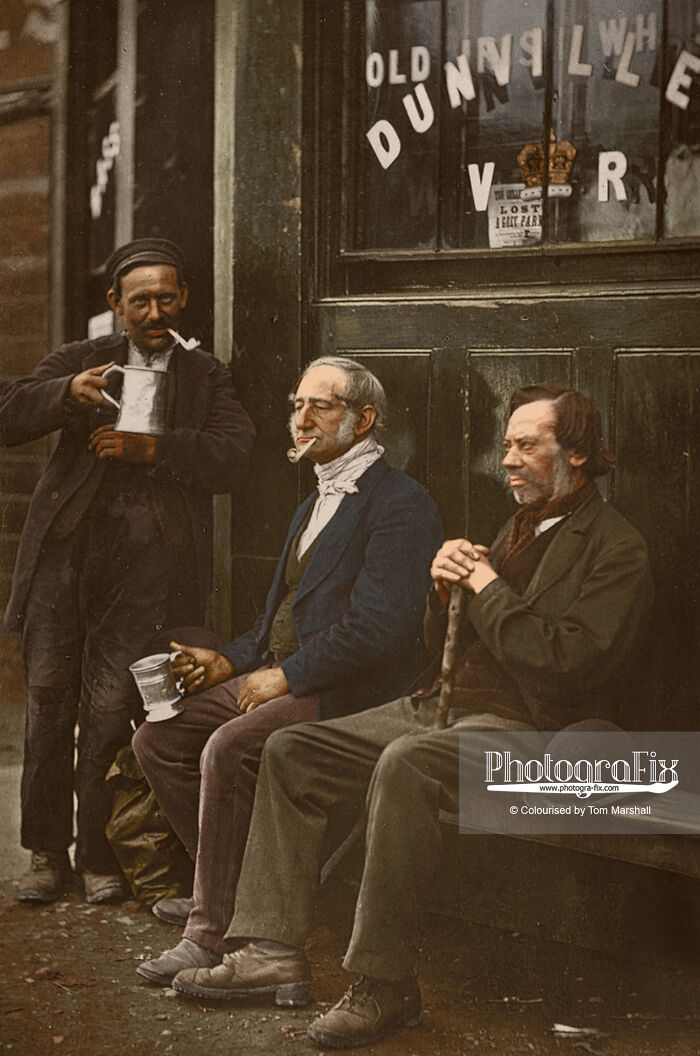

“The wall working or fence working, described by Parker as a “fine property,” is a system of cheap advertising. Where a portion of a wall or fence, near some public thoroughfare, can be rented or obtained gratuitously, it is covered with an array of boards, which are hung up in the morning and taken in at night. In this instance, the boards covered with thin bills are supplied to Cannon [seated on the right], who hangs them up in the morning and receives about a shilling weekly for each board.
But the number of boards afford no clue to the income derived from this mode of advertising, as an indefinite number of dummies are displayed to fill up vacant spaces. The dummies are carefully selected; the advertisements they carry must be as imposing as the names of their owners are respectable. Cannon assured me that it required tact and experience to manage this sort of property. Unfortunately, the dummies have been dominant of late, owing to the depression in all departments of trade. The result is that the wall worker’s property produces a return so poor as hardly to repay the pains bestowed on its management.”
(function(d, s, id)
var js, fjs = d.getElementsByTagName(s)[0];
if (d.getElementById(id)) return;
js = d.createElement(s); js.id = id;
js.src = “https://connect.facebook.net/en_US/sdk.js#xfbml=1&appId=1521032898120611&version=v2.0”;
fjs.parentNode.insertBefore(js, fjs);
(document, ‘script’, ‘facebook-jssdk’));
(function(d)
var js, id = ‘facebook-jssdk’, ref = d.getElementsByTagName(‘script’)[0];
if (d.getElementById(id)) return;
js = d.createElement(‘script’); js.id = id; js.async = true;
js.src = “https://connect.facebook.net/en_US/all.js”;
ref.parentNode.insertBefore(js, ref);
(document));
/*=====================*/
(function()
var po = document.createElement(“script”); po.type = “text/javascript”;
po.async = true;
po.src = “https://apis.google.com/js/plusone.js?publisherid=116390727576595561749”;
var s = document.getElementsByTagName(“script”)[0]; s.parentNode.insertBefore(po, s);
)();
/*=====================*/
!function(e,n,t)(o=e.createElement(n),o.id=t,o.src=”https://connect.facebook.net/en_US/sdk.js#xfbml=1&version=v13.0″,c.parentNode.insertBefore(o,c))(document,”script”,”facebook-jssdk”);(function(d, s, id)
var js, fjs = d.getElementsByTagName(s)[0];
if (d.getElementById(id)) return;
js = d.createElement(s); js.id = id;
js.src = “https://connect.facebook.net/en_US/sdk.js#xfbml=1&appId=1521032898120611&version=v2.0”;
fjs.parentNode.insertBefore(js, fjs);
(document, ‘script’, ‘facebook-jssdk’));https://connect.facebook.net/en_US/sdk.js#xfbml=1&version=v6.0&appId=1443946719181573&autoLogAppEvents=1https://platform.instagram.com/en_US/embeds.js
[ad_2]
Source link






Leave a Reply